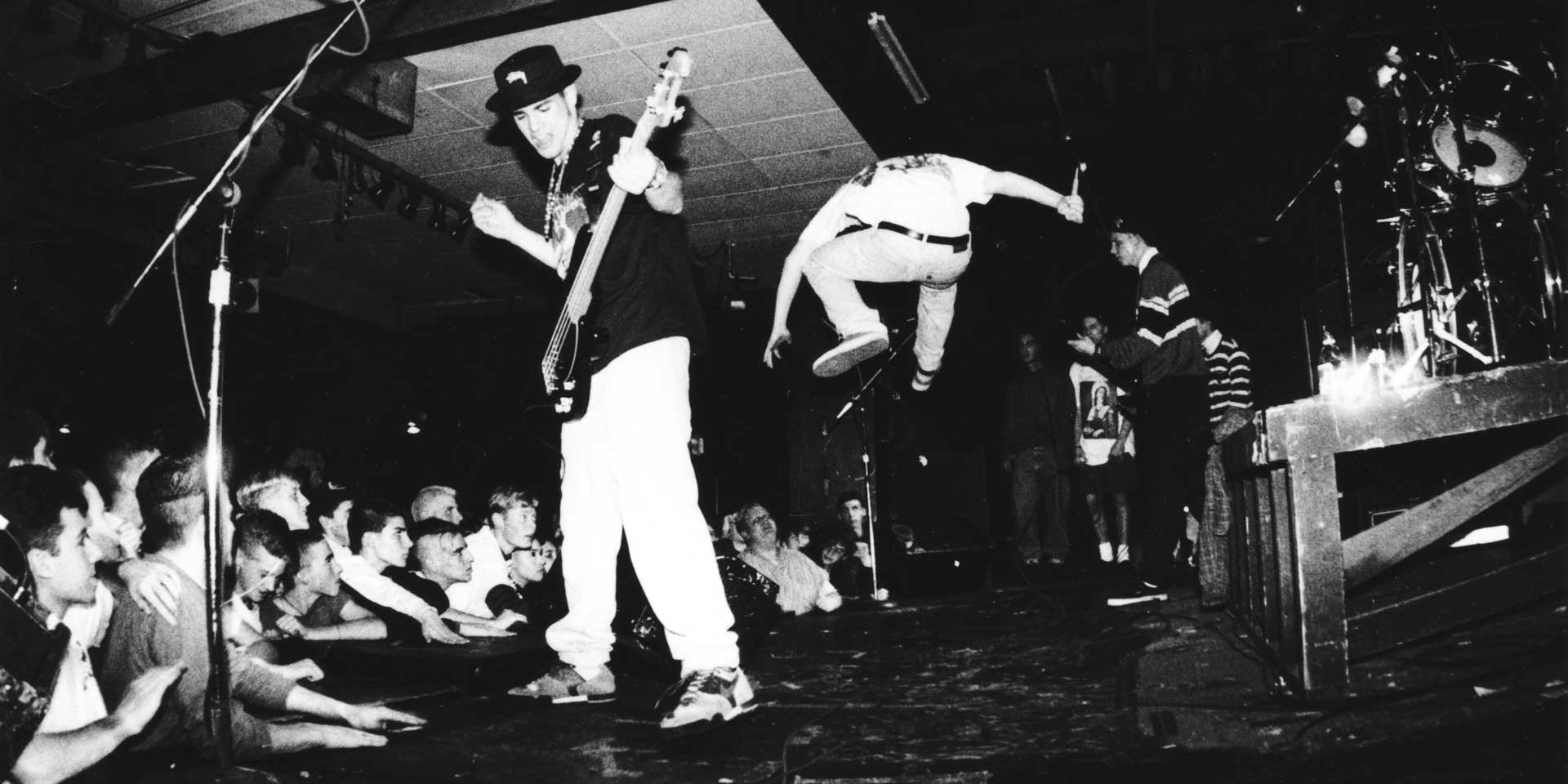Jay Laughlin
Jay Laughlin was the guitar player for Turning Point, a band from New Jersey that was together between 1988 and 1991. Though somewhat short-lived, the band was influential in the hardcore music scene, and in the decades since the group broke up, the music that Jay and his friends wrote and performed has become known around the world. In 2016, the band reunited for a one-time performance as the headlining act at the This Is Hardcore fest in Philadelphia, PA, with selected vocalists standing in for the late singer, Skip Candelori, who passed away in 2002.
Turning Point was from my hometown area in South Jersey, and I have great memories of collecting records, getting dubbed cassette tapes of their unreleased music, going to shows with my friends, and catching a couple of Friday evening garage practice sessions. When I look back on it, I feel a bit fortunate to have lived in that place and time and to have had the friends that I did then.
This interview with Jay was conducted over Skype in March 2017. It was originally intended to be a podcast episode, but after a few long back-to-back workdays and an all-night flight from Honolulu the night before, I was dead tired and the audio just turned out terrible due to some technical problems with my setup. The transcript, however, stands on its own, and I'm glad that I could still share something from it.
There were a lot of things that I probably could have talked with Jay about, like gear, getting the perfect guitar tone, and more band stories, but I really had just one purpose for the interview, and that was to find out some of the background on one of Turning Point’s last recorded songs, which was titled Behind This Wall.
Thanks to Jay for sharing some of this history, and I hope you enjoy the stories.
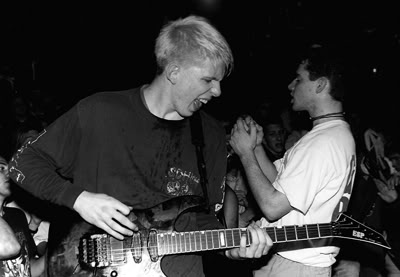
(Courtesy of Double Cross/New Age Records)
I wanted to talk about the Turning Point song Behind This Wall. That was probably one of the last songs that you guys wrote. Is that right?
Yeah. The last songs that we wrote were properly recorded. Behind This Wall was probably the last one.
I think that song was kind of important. While it definitely wasn't the first hardcore song with a melodic intro, I remember that it seemed like it really made an impact, and it kind of became a definitive song within this developing genre that people were calling “emotional hardcore” in the early 1990s. In a way, I think a lot of that had to do with that intro. It was, like, the perfect lead-in to a great hardcore song that was really progressing beyond what Turning Point had been in the years before. I don't know if that makes sense, but…
Yeah, it does. And to be perfectly honest, all of the songs that I wrote…like with the beginning of Thursday or Behind This Wall…those songs were heavily, heavily influenced by my love of heavy metal…Metallica, specifically…because I learned to play guitar listening to all their early records, like Ride The Lightning. They have so many songs that have that kind of acoustic…you know, like fingerpicking, kind of weird classical…that's the kind of stuff that I was always drawn to.
The funnest thing about the intro to Behind This Wall is when we recorded it, it wasn't done with an acoustic guitar. It was done with the band, with Ken and Nick, all put together. But when we went to mix the song, it was just me and Skip in the studio, and I was listening to the front and I was like, "I want to do this…I want to strip all the instrumentation away and just do it with, like, two acoustic guitars."
So, I did it without Ken and Nick knowing. And there's no click track at the beginning, either, so if you listen to the song, you can hear it speed up at the end of the intro because I'm trying to get the whole thing in before we have to punch the whole band in. But, so…I did it, and Skip was like, “Yeah, it's fuckin’ awesome!”
Ken doesn't remember this, but when he got to the studio, he was fuckin’ pissed that I cut the drums and the bass out of the beginning. He was not happy about it. We've talked about it now and he doesn't remember being mad, but I was like, “Yeah, you were fucking pissed.”
So, that was pretty funny. But, yeah…I just did it on a whim. I just wanted to try something different. And that's how that went down.
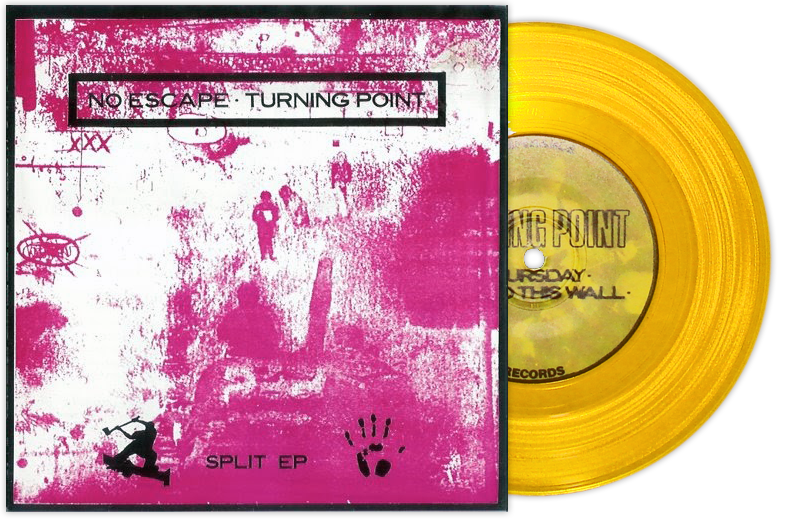
All that Turning Point stuff was written…I was a drummer first, then I started playing guitar. My older brother was given this really shitty Yamaha acoustic guitar that was missing a high E string and he never played it, and I started picking that up and teaching myself how to play. Everything was written on an acoustic guitar, which is pretty funny for hardcore music. I would write it, you know, sitting on my couch, on a crappy acoustic guitar, and then translate it to electric guitar.
Even the songs on the first 7"?
Yeah.
That's so funny. I first heard that 7” e.p. when I was in high school, maybe around 1988 or 1989. I'd been really into thrash metal—bands like Nuclear Assault, Lethal Aggression, COC—but got into hardcore after hearing those first few Revelation releases, along with Turning Point and some others. I remember being really psyched about Turning Point because some of you guys were right in my home town, and I remember that feeling kinda personal and meaning someting. Like, music up to that point was always something untouchable and out there, but hardcore instantly became something accessible after that. I got my friends together and we started our own bands. It was something that we could actually do. The first song on the Turning Point 7” was always one of my favorites, and the demo tape and that EP defined Turning Point to me. Then the 12” record was put out, which was awesome and was a huge progression from the sound on the earlier recordings. But the big thing, I think, was a few months later, I was with some friends one Saturday night and we ran into Ken in a parking lot somewhere and he said that you all had been at the studio that day and recorded, and he had a mixdown on a cassette tape. So, we all crowded around to hear the song Broken on the tape deck of his little pickup truck. Everyone was like, Man…that's so different… But it was awesome.
Yeah. A lot of that came with…to be honest…just progression of becoming a better guitar player. You know? When we made the demo and the 7”, that was about as best as I could play. And then I just kept playing and playing and I just learned more stuff…you know, like I said…just futzing around with that shitty acoustic guitar. That's where all that stuff came from.
Wild.
You know, I was listening to heavy metal intros and trying my best to imitate that. If you listen to the Godspeed e.p., there's that song Flume…an instrumental…like fingerpicking playing…and that's totally just how I wished I was as good as Kirk Hammet and James Hetfield…just ripping them off.
When the music you guys were playing progressed to Behind This Wall, it really started to transcend itself. It pushed a big part of hardcore music into a different direction. Looking back on it now, that's kind of phenomenal.
You know what's funny about that, too, is like…now that me and Ken and Nick have gotten back together and reminisced about the old days, I feel like…now, obviously, the later stuff people love, but at the time, when we wrote it, we felt like nobody liked it. We almost felt like it was too…like, it wasn't hardcore enough and people were losing interest in what we were doing. You know, that's almost why the band split up…because we were like, "Well, I guess nobody gives a fuck about this anymore, so what's the point? We'll move on." You know, it's just funny now looking back where the later stuff was so great. And it's like…well, fuck…at the time it didn't feel that way. But I'm happy that people enjoy it. That's all you can hope for when you write a tune…
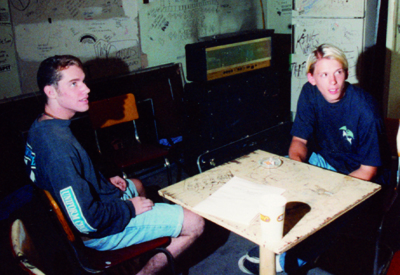
(Photo courtesy Double Cross/New Age Records)
Years ago, I heard an alternate recording of the song. It had the regular guitar at the beginning.
I would love to hear that. That was probably a rough mix before I had decided to do the acoustic guitar thing.
Yeah. I don't think many people knew that existed, and I haven't heard it before or since. I was totally surprised when I heard it.
Yeah, that's funny. I guess that because it sounded too much like the beginning of Thursday or the beginning of Broken and we'd already done that. I just felt like we were repeating ourselves. So, that's why I went for the acoustic guitar instead of all the other instrumentation.
What was that like with you and Skip, working stuff out like that in the studio? Did you both do that kind of thing often, or was that kind of…
Yeah. All the time, really. I mean, it was…like, looking back on all this stuff…when we were recording it…you know, I primarily wrote all the riffs, and then the band would arrange the stuff and piece the songs together…and Skip wrote the lyrics, always totally on his own. We never had any input on that. I've never been a lyric guy. When it comes to music…like, if the music sounds good and the vocals sound cool, I really didn't, you know…I liked his lyrics, obviously, but I never paid that much attention to what he was saying. When he was singing in the studio, I would help coach him along…you know…try this, try that, that sounds good…normal shit that every band does. I'd look at his lyrics here and there, but he wasn't one to offer them up like, “Guys, read this page of words that I wrote.” But looking back on his stuff, I was like, Wow… You know, I think that was part of the draw…he was a young dude, but he was writing some serious shit. You know? Like…
Heavy.
Yeah. He wasn't just scratching together some lines that rhyme. You know what I mean? Like he was actually getting into some really heavy shit. I think it was after he passed away when I really started digging into it and I was just like, Wow… He was pretty fucking brilliant. You know, when it came to writing…putting words to songs…he was…it was some next level stuff, as far as I'm concerned.
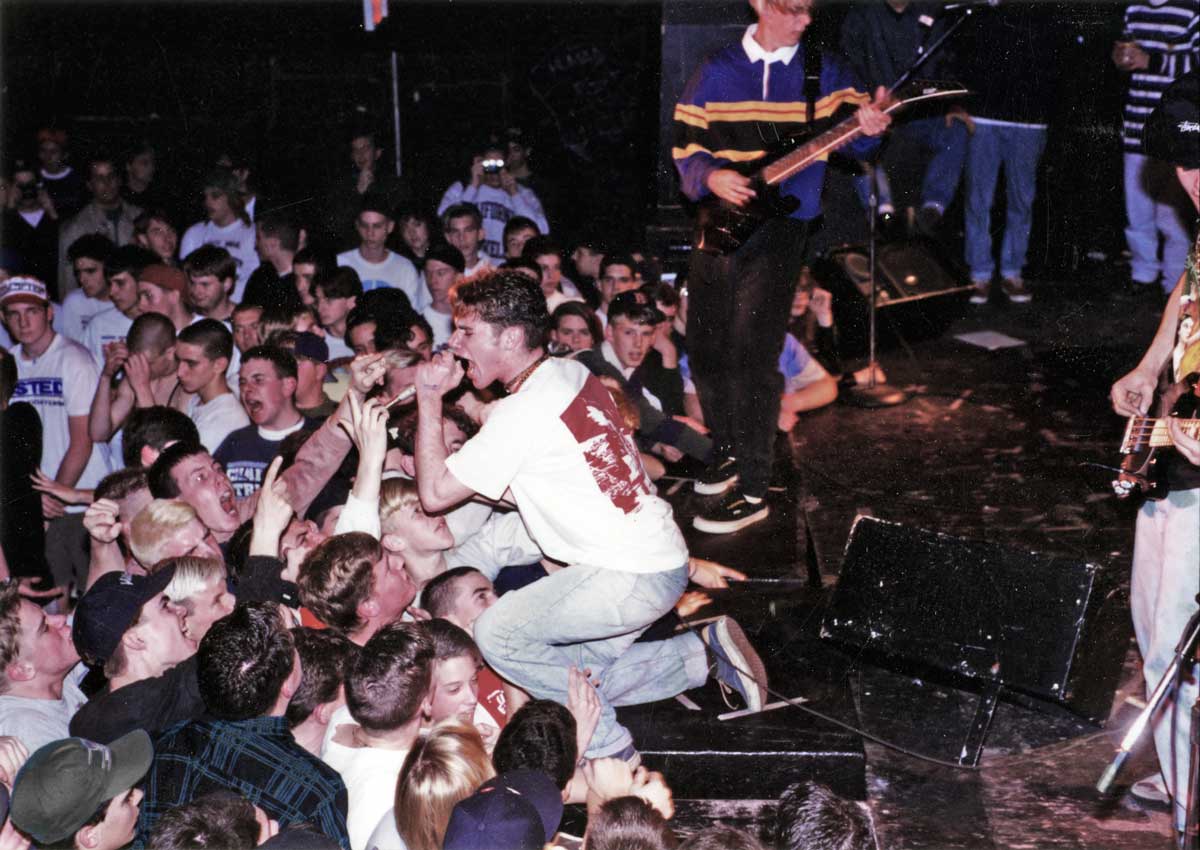
(Photo by Steve Silvers)
Yeah. I agree. You know, when I listen to…well, like Behind This Wall, in particular…when I listen to that song, there are so many things going on in it. The guitar, to me, sounds really energetic and upbeat. Ken's drumming is really powerful and intentional. And Nick…his bass playing isn't just this kind of follow-along-with-the-guitar kind of bass playing. It steps out on its own in places. But the whole thing, in general…like, if you tune out the vocals, it's really upbeat sounding. But then the vocal layer just sounds so tremendously sad and forlorn. And I think that does something so transformational to the whole song. It creates this tension that's just remarkable…
Yeah. Skip had a knack for that, for sure. You know, it's like…even in the first bit of his vocal take, where his voice cracks and, you know, it's obvious, most people would be like, We'll do that over again. But, his voice cracked, but it was one of those things like…"Nah, fuck that. That sounds cool as shit." You know…he was just fucking going for it and he wasn't holding back, and his voice cracked and it sounded fucking cool, and I remember being like, "No, leave that in there." It kind of makes the tune. It's kind of one of those happy accidents, I guess.
Yeah. It's a beautiful flaw.
Yeah.
You know, I really appreciate you making the time to talk with me. It's great to revisit some of those times. Could I ask you one more question before we wrap up?
Sure.
Moshing or stage diving?
(Laughs) Stage diving. Not any more, but…it was funny when…there were a couple of bands that I really wanted to see at This Is Hardcore, and because I was playing and had a pass, I could easily get onto the side of the stage. The first band that I went to watch their whole set was this band called Iron Reagan from Virginia. At the time, I was 44, and I'm standing on the side of the stage and I'm like, Holy shit…I can't believe these kids are going that fucking nuts! But that was exactly what I was doing when I was that age. But I felt like a dad, like…Oooh! Be careful!…with these kids going fucking bananas and I was like, Yeah…I'd fucking break my neck! But back in the day, I was all about stage diving. It was so much fun. I'd mosh, too, but if I had just one choice, I would definitely take the stage dive.
Links
- Turning Point Artist Page (Jade Tree Records)
- Turning Point Wikipedia Entry (Wikipedia)
- Jay Laughlin Interview (Phawker)
- JJL Band (Bandcamp)
Purchase
- Turning Point Complete Discography (Jade Tree Records)
- JJL The Tiger e.p. (Bandcamp)
Videos
- Turning Point / Club Pizazz, Philadelphia, PA (1989) (YouTube)
- Turning Point / BBQ Iguana, Washington, DC (1989) (YouTube)
- Turning Point / Safari Club, Washington, DC (1990) (YouTube)
- Turning Point / City Gardens, Trenton, NJ (Early 1991) (YouTube)
- Turning Point / City Gardens, Trenton, NJ (Early 1991, Alternate Angle) (YouTube)
- Turning Point / Washington, DC (1991) (YouTube)
- Turning Point / Reunion Show, Pennsauken, NJ (1994) (YouTube)
- Turning Point / This Is Hardcore, Philadelphia, PA (2016, Audience Angle) (YouTube)

